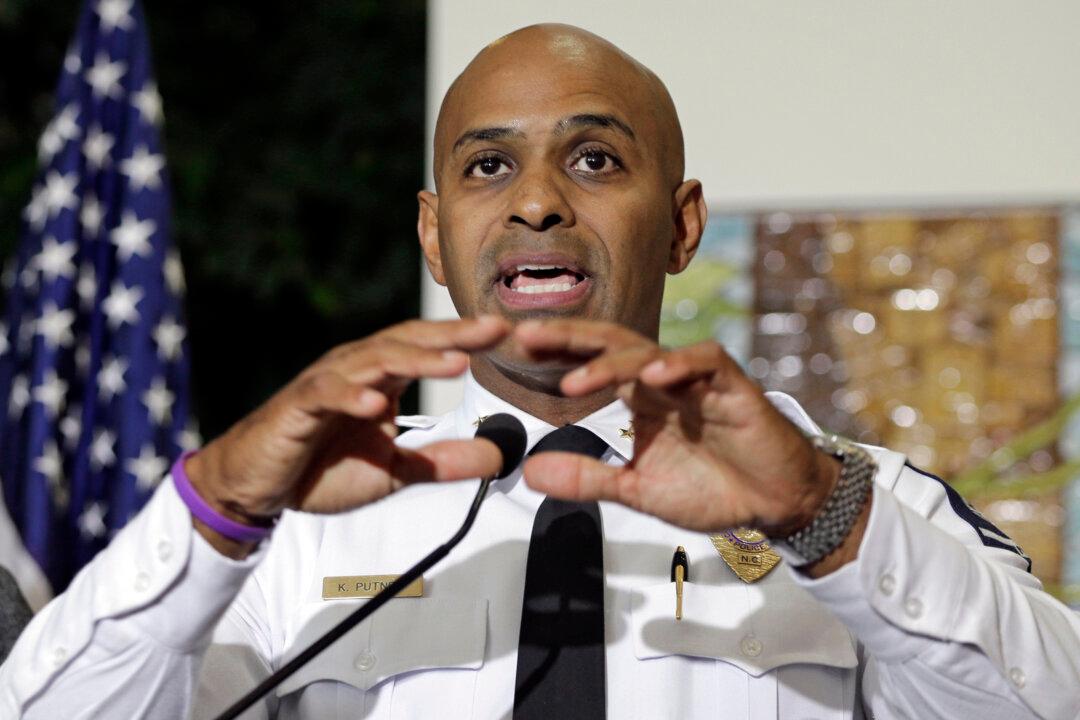CHARLOTTE, N.C.—Charlotte police refused under mounting pressure Thursday to release video that could resolve wildly different accounts of the shooting of a black man, as the National Guard arrived to try to head off a third night of violence in this city on edge.
Charlotte-Mecklenburg Police Chief Kerr Putney said that releasing police dashcam and body camera footage of the killing Tuesday of 43-year Keith Lamont Scott could undermine the investigation. He told reporters the video will be made public when he believes there is a “compelling reason” to do so.
“You shouldn’t expect it to be released,” Putney said. “I’m not going to jeopardize the investigation.”
Meanwhile, an undisclosed number of National Guardsmen assembled in Charlotte, activated by Gov. Pat McCrory after a second straight night of racial unrest of the sort that has convulsed other U.S. cities and seemed at odds with Charlotte’s image as a diverse, forward-looking city of the New South.
On Wednesday night, scores of demonstrators in the city’s bustling downtown section attacked reporters and others, smashed windows of hotels, office buildings and restaurants, and set small fires. Authorities said 44 people were arrested and seven were injured, including four officers.
One protester was shot and critically wounded; city officials said police did not shoot the man.
The demonstrators have been demanding answers in Scott’s killing, with some carrying signs that read “Release the tapes.”
Police have said that Scott was shot to death by a black officer after he disregarded loud, repeated warnings to drop his gun. Neighbors, though, have said that he was holding only a book. The police chief said a gun was found next to the dead man, and there was no book.
Putney said that he has seen the video and it does not contain “absolute, definitive evidence that would confirm that a person was pointing a gun.” But he added: “When taken in the totality of all the other evidence, it supports what we said.”
The police chief said his priority is working to honor a request from Scott’s family to see the video. He acknowledged that he has promised transparency in the investigation, but said, “I’m telling you right now, if you think I say we should display a victim’s worst day for consumption, that is not the transparency I’m speaking of.”
Experts who track shootings by police noted that the release of videos can often quell protest violence, and that the footage sometimes shows that events unfolded differently than the official account.
“What we’ve seen in too many situations now is that the videos tell the truth and the police who were involved in the shooting tell lies,” said Randolph McLaughlin, a professor at Pace University School of Law. “Without the video to document what actually happened, we have no way of knowing the truth. The camera doesn’t lie.”
Other cities have released footage of police shootings. Just this week, the Tulsa, Oklahoma, police department made public video of the disputed Sept. 16 shooting death of an unarmed black man by a white officer. But what actually happened remains murky.
Last year, a Chicago police officer was charged with murder the same day the city released dashcam video that showed him shooting black teenager Laquan McDonald 16 times, footage that contradicted the accounts of officers who said the teen swung a knife at them.
“We all stand together declaring there must be transparency and the videos must be released,” the Rev. William Barber, president of the North Carolina NAACP, said at news conference. “At this point, there is speculation because the videos have not been released. Be clear: There is unrest in Charlotte and across America because of what we do know.”
North Carolina prosecutors are asking the State Bureau of Investigation to look into the shooting, and the U.S. Justice Department is sending to Charlotte a team of peacekeepers trained to resolve community conflicts. Hours before nightfall Thursday, the police chief said he saw no need for a curfew.
As the investigations continue, McLaughlin said: “I think it’s irresponsible for the police department in Charlotte to not have immediately released the tape, regardless of what it shows.” He added: “People have the right to know.”





